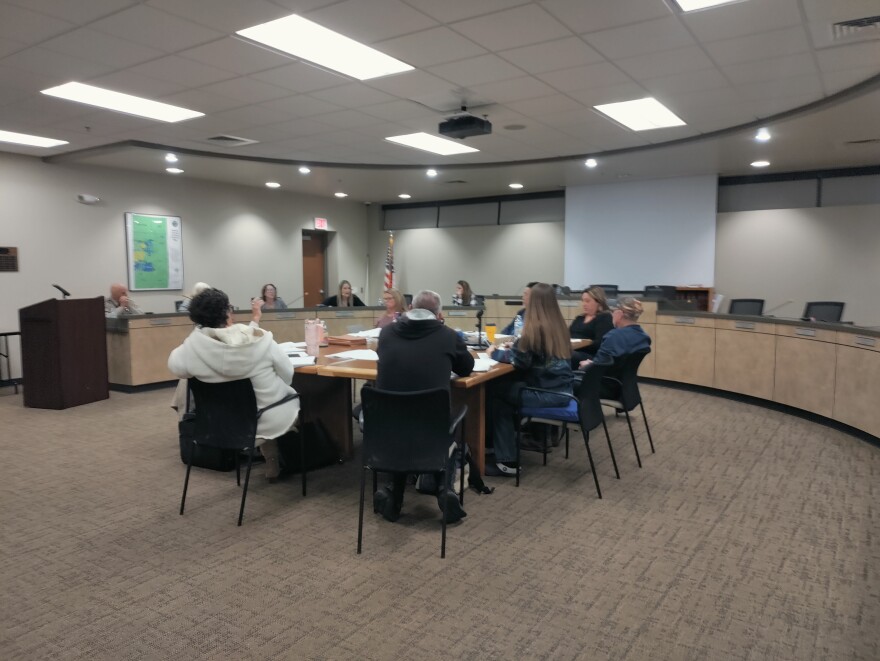The Boone County Board is again reviewing its regulations on Mexican-style rodeos. On Tuesday night, the animal show ad hoc committee passed a motion to ban steer tailing. It's the sole sporting event held at these rodeos. Among those attending the meetings is the county state’s attorney’s office. They don’t hold a vote on the committee, but are key in advising the group towards court-defense proof policy recommendations.
Since August, Boone County Assistant State’s Attorney Karla Maville has represented the state’s attorney’s office during the ad hoc committee meetings. She's been with the state's attorney's office for seven years.
“I like my job,” she said. “I love my board, I love my community,” she added. “I love serving my community.”
The committee created a list of topics for review regarding charrerias (Mexican-style rodeos) held in the county.
“This has been a divisive issue in our county and the purpose of the committee is to give everyone a voice,” she said. “So, I don't step in when they are sort of spit-balling ideas.”
She does serve as a referee and lets the board know routinely in some instances that their proposals may be out of bounds legally and thus difficult to defend in court.
“Kind of over and over," she said. “If the board chooses to do X, and somebody decides to challenge that, will the court uphold what they've chosen to do? “
She said the both the U.S. and the Illinois Constitution apply to the county and its actions.
Many constitutional rights deal with protecting citizens against government overreach.
“Even in something as sort of small and specific like getting a temporary use permit so that you can have a rodeo,” she said, “you have certain constitutional rights that the government cannot infringe on.”
Her job is to give the board enough information so that they can decide whether the benefit of a restriction on a person or use of property outweighs the risk that it may be challenged in court.
“We would much rather create a good solid policy upfront,” Maville said, “then to try to then have something that has issues with it and try to defend it on the back end.”
So, she prods them to think through their proposals.
“What's the problem we're trying to solve here?” she asks. “Because once you identify the problem, it's a lot easier to come up with solutions that are legal.”
She said this answer is necessary for her to write code language, and she said the purpose of the proposal has to be clear.
“Governments are only allowed to enact ordinances for a proper purpose,” she said, “for a non-discriminatory purpose, for a legitimate government interest.”
Not everyone on the county board is pleased with her approach.
“You got a state's attorney that keeps telling you what she can't do instead of telling you what you can do,” said Boone County board member Marion Thornberry during public comments at a November ad hoc committee meeting. “Find somebody that can tell you what you can do.”
Maville said she gets the sentiment.
“We don't want our board to end up in court, and so, our advice tends to be very conservative in that regard,” she said. “Certainly, I empathize with his frustration, because lawyers do sort of slow down the process.”
Maville’s role sometimes calls for her to be a naysayer. For example, some board members want to require property owners to carry some form of insurance for having alcohol at the events. But she said the law doesn’t require it, since they don’t sell booze at the events. They’re BYOB -- bring your own bottle (or booze).
“In 2022 it did not appear that any of the calls to the sheriff's department involved alcohol,” she said.
Property owners hosting rodeos are required under the current ordinance to have a million-dollar liability policy that covers all incidents at the events.
Maville said that it’s the opinion of the office that the county holds no liability for incidents that happen at rodeos. Some aren’t so sure.
“I just think maybe we should talk to a lawyer that is a professional in insurance for liquor possibly,” said county board member Raymond Larson during a November meeting.
During discussion regarding live music playing at the events, Maville said it calls into question the role of government.
She says the county doesn’t go around looking for code violations.
Here are her remarks during a September meeting.
“If the board wants to move toward having a code enforcement officer whose job it is to go out and look for code violations, that needs to apply to the entire code,” she said. “And that is a full-time position probably.”
She said it doesn’t do any good to add more regulations that the county can’t enforce or doesn’t have the staff to enforce.
“And, people, generally speaking, don't want the government everywhere,” she said.
The committee has meetings scheduled throughout December.



